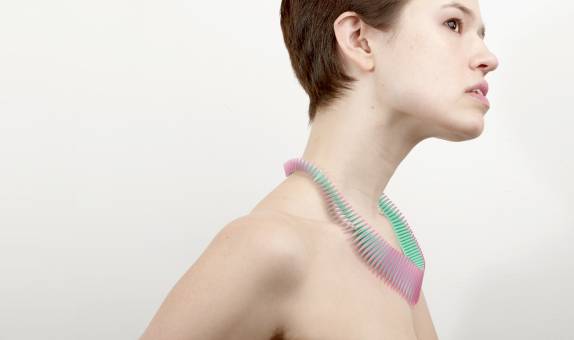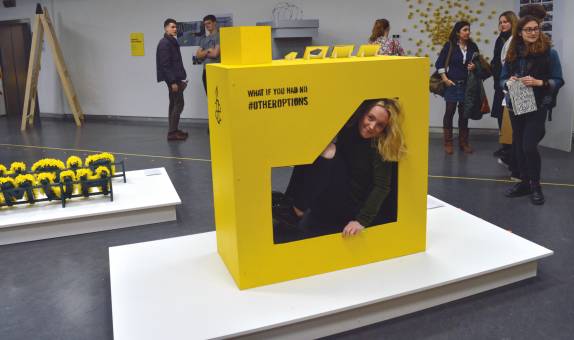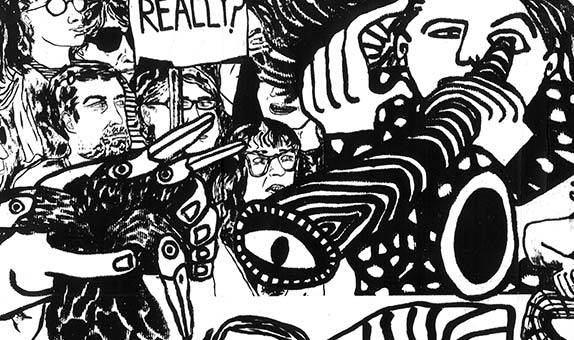Interaction Design BA (Hons)
Why choose this course?
BA (Hons) Interaction Design focuses on human experience, employing a human-centred approach to interactive storytelling and immersive experience design. You will create and design interactions and experiences that address urgent issues and experimental ideas through innovative technologies, creative responses, and critical speculative practices. Emphasising creativity and adaptability, BA (Hons) Interaction Design promotes learning through making with access to world-class workshops and fabrication facilities, including digital making and immersive media labs.
The course is uniquely situated within the Department of Illustration Animation, renowned for nurturing graduates who become leading practitioners in their fields. As a student, you'll be an integral part of this dynamic community and collaborative atmosphere that encourages the exchange of ideas, processes, and methods, fostering new opportunities and growth within the discipline.
Please note: this course is still subject to validation. Some course information may not be available at this time.
| Attendance | UCAS code | Year of entry |
|---|---|---|
| 3 years full time | W280 | 2025 |
Please note: this course is still subject to validation.
Please note: Teaching on this course may take place on more than one KU campus.
| Main Location | Kingston School of Art, Knights Park |
Reasons to choose Kingston
- Interaction Design is uniquely located within the highly regarded Department of Illustration Animation which has an excellent reputation for nurturing graduates who go on to be leading practitioners within their field.
- We are currently ranked No.1 in London and Top 5 in the UK for Graphic Design* in the Guardian League Tables 2023
(*covers Graphic Design and Illustration Animation).
The Art School Experience
As part of Kingston School of Art, students on this course benefit from joining a creative community where collaborative working and critical practice are encouraged.
Our workshops and studios are open to all disciplines, enabling students and staff to work together, share ideas and explore multi-disciplinary making.

What you will study
The course nurtures your ability to develop innovative practices through digital and analogue methods. Exploring interactive narrative, game design, extended reality, and trans-media storytelling, you will integrate participation design and physical fabrication with creative computing and emerging technologies to create new ways to reach audiences and tell stories.
By engaging with pressing societal issues, you will deepen creative and critical thinking through contextual studies, contemporary philosophy and inclusive design practices. Set briefs, self-initiated projects, and collaborative assignments are developed to build confidence and self-awareness to showcase your strengths through critical discussions and peer interactions.
Interdisciplinary collaborations and real-world projects with creative industries provide practical experience, applying your skills in professional contexts. Access to staff practitioners and alumni networks offers further insights and opportunities through professional talks, studio visits, and work placements.
Content for this course includes:
- Developing approaches to interpersonal and spatial storytelling.
- Using sensing, information capture and feedback response to engage with our surroundings and the needs of others.
- Understanding human action and behaviours through testing and contextualising ideas.
- Applying content and meaning to appropriate platforms and engage audiences.
- Critical thinking around digital and analogue technologies, craft, and methods of making.
- Engaging with pressing societal issues through critical thinking in contextual studies and contemporary philosophy.
Year 1
Year 2
Year 3
The first year introduces principles of interaction design through its focus on human experience and the body as instrument. It asks primarily how we receive and understand information and how we communicate effectively with sensitivity to audience needs.
Modules
Practice: Sensing and Storytelling
30 credits
Practice: Sensing and Storytelling focuses on researching, making, and communicating narrative by introducing the fundamentals of interaction design practice: sensing and experiencing, idea generation and problem solving, responding and communicating. This module focuses on human experience and considers the body as instrument to develop empathetic, interpersonal communication skills, and introduce sensing and inclusive design as core research methods.
By exploring relationships between content, form and meaning in relation to storytelling and narrative practice, you will learn how to engage and communicate with audiences in variety of contexts. You will recognise and appreciate the breadth and depth the discipline has to offer by engaging with a diverse range of interaction design methods. Criticality is introduced as a key skill, through the testing of ideas, discussion with peers and tutor-led reviews.
Practice: Thinking Through Making
30 credits
Process: Thinking Through Making introduces the tools, processes and technologies used within interaction design practice. Through a series of workshops and projects you will embrace process and suspend-judgement by exploring making through a diverse and challenging range of media and technologies including physical and digital making, virtual production and extended realities, performance and sound design, creative computing and coding.
This module supports your confidence in making and the use of prototyping as a speculative and iterative process to generate ideas. Physical fabrication and digital making workshops, the immersive lab and virtual workspaces are presented as specialised working environments where you can practice skills and develop your craft as interaction designers.
Presentation: Consult...Create...Collaborate!
30 credits
Presentation: Consult... Create... Collaborate! will introduce you to Future Skills through engagement with Navigate. It will enable you to begin to develop your professional identity and global citizenship, by promoting your understanding of ethical issues and values, design thinking, and commercial awareness. These concepts and associated activities will support you to plan your own personal and professional development, as a means of developing your creative practice. This will be supported through active engagement with the Navigate programme, and through personal development planning (supported by personal tutors), which will enable you to reflect upon your Future Skills graduate attributes. It will also enable you to reflect on and begin to evidence your understanding of the skills you are developing holistically; through all the work you are creating as part of your course.
Communication Design History for Illustration Animation and Interaction Design
30 credits
This module introduces how we think critically about the history of illustration animation and interaction design, and how the knowledge produced can inform practice. This module addresses the categories and concepts, frameworks and tools used to understand illustration animation and interaction design, how they have evolved, and how these histories interweave with those of film, graphic design, product design, fine art and other disciplines. As part of this, we ask fundamental questions about how history is told and taught and what kinds of knowledge are valued and centred.
The first part of the module examines the dominant ways histories of illustration animation and interaction design have been constructed, and how we might challenge Euro/Western-centric perspectives. The second part considers how we can look at the diverse themes, platforms, and media of illustration animation and interaction design through different theoretical frames that speak to different ways of knowing.
The second year takes an expansive approach to interaction design practice. It explores our environmental experience and sees the body in space. Outward-facing and immersive activities are engaged to situate action, invite agency and contextualise experience.
Modules
Practice: Instigation/Activation
30 credits
Practice: Instigation/Activation expands narrative and communication skills through human-environmental experience. It considers the body in space by engaging immersive storytelling and spatial narratives to situate action, invite agency and contextualise experience. Interaction design practice is developed and understood through user consultation, in defining audience needs and exploring inclusive design methods.
Criticality is developed as a key skill; you are asked to take an analytical approach to the resolution of briefs and question how form and content can be unified to resolve a project to a deadline. Projects are used to encourage and support both team and collaborative working, which are central to contemporary interaction design practice.
Process: Make...Test...Prototype!
30 credits
Process: Make... Test... Prototype! supports an individual approach to using tools, processes and technologies within an interaction design practice. Through a series of workshops and projects, you will embrace process and suspend judgement by exploring making through a diverse and challenging range of interconnected media and technologies. Physical and digital making, virtual production and extended realities, performance and sound design, creative computing and coding are presented as methods that can be selected and utilised.
This module develops the process of prototyping ideas from initial ideas to working blueprints through testing, iteration, and consultation. Physical fabrication and digital making workshops, immersive lab and virtual workspaces are presented as specialised working environments where you can practice skills and develop your craft as interaction designers.
Presentation: Agency in Context
30 credits
Presentation: Agency in Context supports individual approaches to forming and nurturing relationships as part of a creative practice. It does this by developing your graduate attributes, and the Future Skills Explore Learning Outcomes delivered in this module. It builds on prior learning and engages with personal development activities aimed to strengthen professional identities, global citizenship, and provide opportunities to expand knowledge of the industrial and professional contexts for interaction design practice. This enables further development of professional skills, including interdisciplinary and collaboration, in preparation for future employment, which will require the ability to work with people from other disciplines.
Critical Issues in Innovation Design: Research & Practice
30 credits
This module connects the contemporary practice of interaction design to wider critical issues and debates within the fields of art & design, as well as society, culture, politics, economics, philosophy, science and technology more broadly. By engaging with urgent critical questions, and experimenting with different theoretical frameworks and research methods, you will be able to identify the topics, lines of enquiry and modes of research that interest you, and which you want to pursue in independent research at Level 6.
The first part of the module explores a range of critical issues related to the production, dissemination and consumption of interaction design by applying different theoretical perspectives to contemporary case studies. The second part of the module focuses on the research methods through which interaction design can be investigated and understood.
The third year addresses complexity and nuance across interaction design platforms. It considers collective experiences by understanding bodies as network. Autonomous approaches to learning, speculative outcomes and the development of individual creative practices are supported.
Modules
Practice: Connections with Purpose
60 credits
Practice: Connections with Purpose considers collective experience by understanding bodies as network. Trans-media storytelling and community engagement embrace individual and collective interaction design practices with awareness of context, audience needs, and a growing set of skills and methods. Autonomy, resilience, and self-reliance are nurtured through increasing levels of self-direction and independence, culminating in the proposal, negotiation, and delivery of an extended project.
A focus on research methods, ethics, inclusive practices and positioning enables you to formalise and apply you own specific methodologies with confidence. This module consolidates practical approaches to prototyping ideas, and form and content are synthesised fully to resolve projects to a deadline. Projects are used to define and establish a personal practice, engage in discipline specific critical dialogues, and foster long-lasting professional relationships with peers through group and collaborative working.
Presentation: Critical and Cultural Positions
30 credits
Presentation: Critical and Cultural Positions supports independence and self-reliance in the forming and nurturing of relationships as part of a creative practice. Future Skills is developed through engagement with Apply. It encourages you to plan for your continuing personal and professional development, and to consolidate an individual approach to managing career aspirations and future learning, by further strengthening your professional skills and identity, and global citizenship.
You will critically evaluate your own personal development through reflection on your progress, as a means of developing your creative practice, and to explore complex problems beyond the University. Personal development planning will enable you to evidence your understanding of the skills you are developing, through all the work you are creating as part of your course, and to set goals and take actions which further your ambitions. Public presentation and engagement are recognised as core principles of interaction design practice and opportunities to showcase work is supported.
Independent Research Project in Critical and Historical Studies
30 credits
Building on the links between research and practice embedded at Level 5, Independent Research Project in Critical and Historical Studies module focuses on in-depth research, critical enquiry and reflection on questions and critical issues emerging in you' own practice, and pertinent to the practice of their own discipline.
Over the module, you will initiate and develop an individual research topic; identify and evaluate appropriate archives, bodies of critical literature, visual/material sources and research methods; manage your study time; engage with and respond to tutorial dialogue and peer feedback, and apply critical and analytical skills to produce an output of 5-6,000 word (or equivalent) representing the culmination of your research project. You will be supported by a series of lectures, seminars, and tutorials.
Future Skills
Knowledge to give you the edge
Embedded within every course curriculum and throughout the whole Kingston experience, Future Skills will play a role in shaping you to become a future-proof graduate, providing you with the skills most valued by employers such as problem-solving, digital competency, and adaptability.
As you progress through your degree, you'll learn to navigate, explore and apply these graduate skills, learning to demonstrate and articulate to employers how future skills give you the edge.
At Kingston University, we're not just keeping up with change, we're creating it.

Entry requirements
Teaching and assessment
The course will be delivered though workshops, lectures, seminars, individual and group tutorials, project briefs, live briefs, demonstrations, study visits, peer learning, independent learning, and study skills.
Methods of assessment for the course are by practical and written coursework.
Facilities
The course is taught at Kingston School of Art, one of the leading art and design institutions in Europe.
Our teaching is guided by two principles: that our students learn by the process of making; and that students are critical practitioners who contribute to the development of the subject areas.
Many of the staff in Kingston School of Art are current practitioners and have extensive experience and professional links, helping you to develop your skills, networks and gain access to industry contacts.
After you graduate
Students studying Interaction Design BA (Hons) can look forward to a broad range of professional opportunities and creative careers that include the following:
- Interaction Designer
- Exhibition Designer
- Experience Designer
- Production Designer
- Design Researcher
- Digital Designer
- Producer
- Project Manager
- Art Director
- Creative Director
- Immersive Storyteller
- Illustrator
- Animator
- Graphic Designer
- Games Designer
- Artist
- Performer
- Educator
- Community Outreach Facilitator.
Course changes and regulations
The information on this page reflects the currently intended course structure and module details. To improve your student experience and the quality of your degree, we may review and change the material information of this course. Course changes explained.
Programme Specifications for the course are published ahead of each academic year.
Regulations governing this course can be found on our website.





